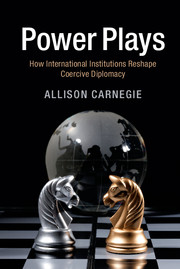Book contents
- Frontmatter
- Contents
- Figures
- Tables
- Acknowledgments
- 1 Introduction
- 2 Theoretical Framework
- 3 Bilateral Agreements and State Similarity
- 4 WTO Membership as a Commitment Strategy
- 5 Coercive Diplomacy in Comparative Perspective
- 6 Agreements and the Displacement of Coercion
- 7 Reduced Effectiveness of Coercion: Evidence from the United States
- 8 Conclusion
- Bibliography
- Index
8 - Conclusion
Published online by Cambridge University Press: 05 November 2015
- Frontmatter
- Contents
- Figures
- Tables
- Acknowledgments
- 1 Introduction
- 2 Theoretical Framework
- 3 Bilateral Agreements and State Similarity
- 4 WTO Membership as a Commitment Strategy
- 5 Coercive Diplomacy in Comparative Perspective
- 6 Agreements and the Displacement of Coercion
- 7 Reduced Effectiveness of Coercion: Evidence from the United States
- 8 Conclusion
- Bibliography
- Index
Summary
Attempts to support national interests and achieve political objectives without waging war engross leaders worldwide. Yet despite its importance, coercive diplomacy has remained something of a mystery. When do states succeed in coercing their partners, and how do their targets defend themselves? What are the political and economic implications of these efforts?
This book considered these questions in detail, showing that the capacity to coerce other states can create political hold-up problems, as states reduce cooperation that would make them vulnerable to opportunistic behavior. Because coercive diplomacy represents an indispensable part of interstate interactions, hold-up problems are pervasive in international relations. However, states can use membership in international institutions to solve these problems because these bodies both allow members to credibly commit to not wielding certain tools to extort concessions from other members and protect members from having these instruments used against them. Yet, because institutions ban the use of some forms of leverage, members attempt to do so using alternative means, altering the sites of coercion in international relations and reducing the effectiveness of their efforts.
In support of the theory, I supplied evidence obtained using a multimethod approach. After developing this logic formally, I tested the implications of the model using statistical analyses, case studies, and other descriptive evidence. While none of my results on its own demonstrates irrefutable proof of the theory's claims, as a whole my findings present a compelling picture of the relationship between political hold-up problems and the practice of coercive diplomacy, particularly in the context of international institutions. In this concluding chapter, I explore the possibility that states are held up during the process of accession to international institutions, and explain what this might mean formy argument. I then close the chapter with a discussion of the theory's implications for both policy making and scholarship.
hold-up at accession
While membership in an international organization can solve political hold-up problems, states may also hold up their partners that try to join one. Often, once states comply with initial entry requirements, existing members demand additional concessions. However, because states fear that memberswill increase their demands once they invest in meeting the initial criteria, they hesitate to invest in the first place. Therefore, accession may not occur even when it could benefit both current and aspiring members.
- Type
- Chapter
- Information
- Power PlaysHow International Institutions Reshape Coercive Diplomacy, pp. 155 - 164Publisher: Cambridge University PressPrint publication year: 2015
- 1
- Cited by



